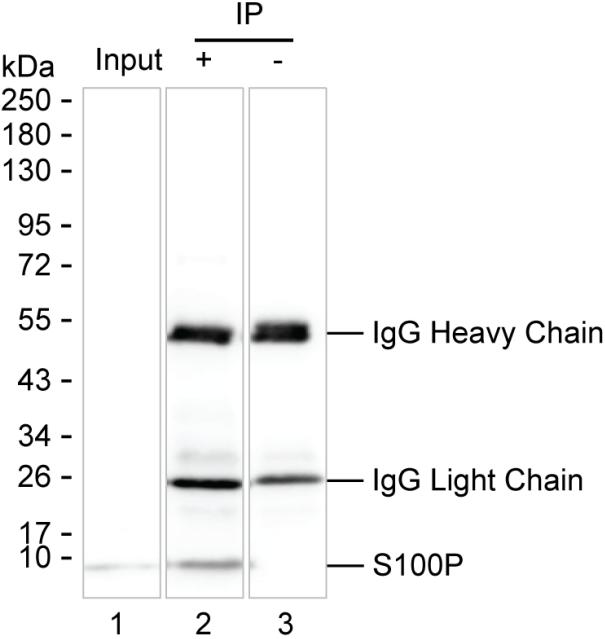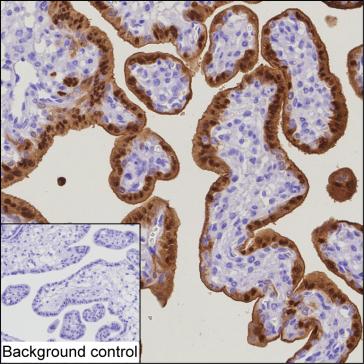

| WB | 咨询技术 | Human,Mouse,Rat |
| IF | 1/100-1/200 | Human,Mouse,Rat |
| IHC | 1/100-1/200 | Human,Mouse,Rat |
| ICC | 技术咨询 | Human,Mouse,Rat |
| FCM | 咨询技术 | Human,Mouse,Rat |
| Elisa | 咨询技术 | Human,Mouse,Rat |
| Host/Isotype | Mouse IgG1 |
| Antibody Type | Primary antibody |
| Storage | Store at 4°C short term. Aliquot and store at -20°C long term. Avoid freeze/thaw cycles. |
| Species Reactivity | Human |
| Immunogen | Purified recombinant fragment of human S100P |
| Formulation | Purified antibody in PBS with 0.05% sodium azide |
+ +
以下是关于S100P抗体的3篇参考文献的简要信息,涵盖其在不同研究中的应用和验证:
---
1. **文献名称**:*S100P antibody as a marker for pancreatic ductal adenocarcinoma*
**作者**:Arumugam T, et al.
**摘要**:研究验证了S100P抗体在胰腺导管腺癌(PDAC)诊断中的应用,发现其通过免疫组化(IHC)在肿瘤组织中高表达,而在正常胰腺组织中几乎无表达,提示其作为PDAC生物标志物的潜力。
---
2. **文献名称**:*Characterization of a novel monoclonal antibody against human S100P protein*
**作者**:Wang H, et al.
**摘要**:报道了一种新型S100P单克隆抗体的开发,通过Western blot和免疫荧光验证其特异性,证明其可识别天然和重组S100P蛋白,并成功应用于胃癌组织样本的免疫组化分析。
---
3. **文献名称**:*S100P expression in lung cancer and its interaction with anti-S100P antibodies*
**作者**:Chen Y, et al.
**摘要**:探讨了S100P在非小细胞肺癌(NSCLC)中的表达模式,使用S100P抗体进行IHC和流式细胞术分析,发现其高表达与患者预后不良相关,提示其可能作为治疗靶点。
---
这些文献展示了S100P抗体在癌症研究中的多样化应用,包括诊断、抗体开发及机制探索。如需具体文章,建议通过PubMed或科研数据库进一步检索。
The S100P antibody targets the S100P protein, a member of the S100 family of calcium-binding proteins. S100P is implicated in cellular processes such as cell cycle regulation, differentiation, and cytoskeletal dynamics. Initially identified in placental tissue, it is overexpressed in various cancers, including pancreatic, colorectal, breast, and prostate cancers, where it promotes tumor progression, invasion, and metastasis by modulating pathways like the epithelial-mesenchymal transition (EMT) and extracellular matrix remodeling.
Antibodies against S100P are widely used in research and diagnostics to detect its expression in tissues or biofluids, aiding in cancer diagnosis, prognosis assessment, and therapeutic targeting. Its role as a potential biomarker is supported by studies linking elevated S100P levels to aggressive tumor behavior and poor clinical outcomes. However, the protein's dual role in both normal physiology and pathology complicates its therapeutic targeting.
Research on S100P antibodies continues to explore their utility in immunohistochemistry, Western blotting, and ELISA, with efforts to refine specificity and sensitivity. Challenges remain in understanding context-dependent regulation and cross-reactivity with other S100 proteins. Despite this, S100P antibodies remain critical tools for unraveling its oncogenic mechanisms and advancing precision oncology strategies.
×